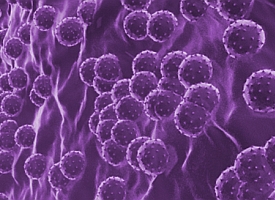Updated 11 October 2014. The U.S. Food and Drug Administration approved a drug combining a new compound, ledipasvir, with the existing drug sofosbuvir to treat hepatitis C genotype 1, the most common form of the disease. The combination of ledipasvir and sofosbuvir is developed and marketed under the brand name Harvoni by Gilead Sciences Inc. in Foster City, California.
Hepatitis C is a viral infection affecting the liver, with some 3.2 million infected with the virus in the U.S., according to Centers for Disease Control and Prevention. The disease is transmitted through contact with infected blood; intravenous drug users sharing needles are among those at the highest risk. The virus causes inflammation of the liver and can lead to scarring and poor liver function (cirrhosis) over many years. Because there are no symptoms early on, many people with hepatitis C infections do not get treatment until more serious complications occur.
There are 6 known genetic types of hepatitis C, with genotype 1 accounting for 75 percent of all cases in the U.S. Genotype 1, however, is the least likely of the major types of the disease to respond to treatment.
Harvoni is the first drug to combine ledipasvir with sofosbuvir to treat hepatitis C, genotype 1. FDA approved sofosbuvir, also made by Gilead Sciences and marketed under the brand name Sovaldi in December 2013 to treat hepatitis C. Sovaldi, like Harvoni, is a once-a-day pill, and is taken with other drugs, such as ribavirin.
Harvoni, however, was tested in clinical trials, and found as effective when taken alone as with ribavirin. FDA cited three sets of late-stage clinical trials in its approval decision that show Harvoni enabled 94 percent of hepatitis C patients to be free of the virus in their blood after 8 weeks, and 96 to 99 percent virus-free after 12 weeks. Patients who underwent previous therapies required 24 weeks to be virus-free.
FDA reviewed Harvoni under its priority review program, which grants expedited review for treatments showing a substantial improvement over current drugs for serious or life-threatening conditions. The agency also called the drug a breakthrough therapy, thus also qualifying for expedited attention.
Forbes magazine reports today that Harvoni, like Sovaldi, will be an expensive drug, costing $94,500 for a 12-week course of treatment. Sovaldi costs $84,000 for a full treatment. The magazine says 35 states require prior authorization for Sovaldi, including a liver biopsy to determine severity of disease, before Medicaid authorities in those states will approve payments for the drug.
Update: 11 October 2014. The New York Times points out this morning that most people taking Harvoni will need only the 8-week course of treatment, making its cost over that time $63,000, less than the $84,000 needed for 12 weeks of Sovaldi. The cost per dose of Harvoni, $1,125, is still more than $1,000 for Sovaldi.
Read more:
- Johnson & Johnson Acquires Biotech Developing Anti-Virals
- New Hepatitis C Treatment Given FDA Breakthrough Status
- Vertex to Partner with Janssen, GSK on Hepatitis C Drugs
- Generic HIV Drugs Save Money, But Could Impair Effectiveness
- U.S. Patent Awarded for Synthetic Hepatitis C Biocatalysts
* * *


 RSS - Posts
RSS - Posts
You must be logged in to post a comment.